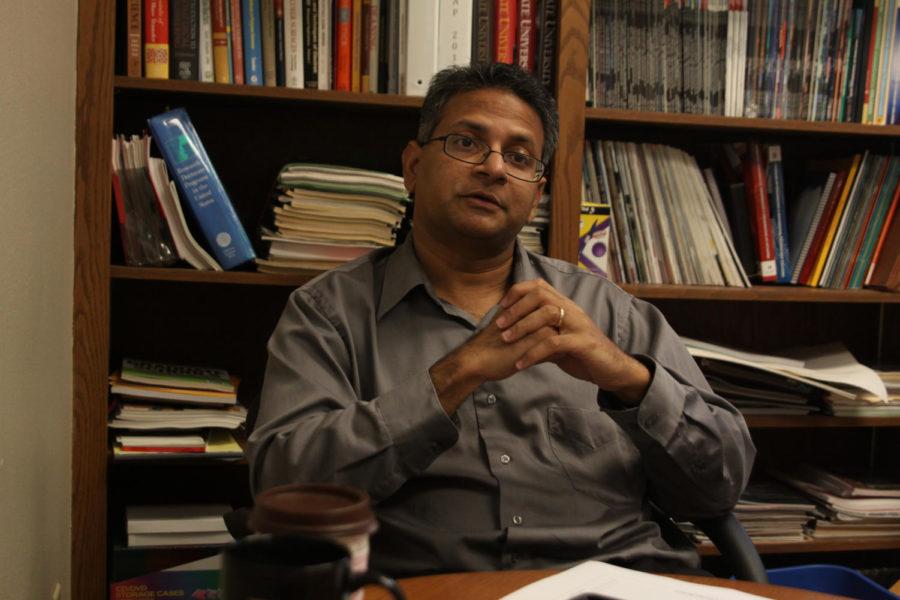Patents key to Iowa State’s future
Photo: Dong Ding/ Iowa State Daily
Balaji Narasimhan, associate dean of research for the College of Engineering, answers questions about the patent program Monday, Oct. 15, in his office.
October 17, 2012
Research and innovation have long been a cornerstone of the educational excellence that defines Iowa State. Following a Congressional act that largely aids inventors, the time is ripe for more research.
“[Iowa State] has a very strong research portfolio, which has been increasing over the last five to six years,” said Balaji Narasimhan, associate dean of research for the College of Engineering.
In 2011, the Leahy-Smith America Invents Act was passed by Congress. This act has many facets to it, but the biggest change that will result when the act is fully enacted in March of 2013 is the switch from “first to invent” to “first to file.”
In short, this will result in an inventor receiving a patent in relation to when they file their invention rather than the date of invention. This will further result in an accelerated process for prospective inventors patenting their intellectual property, according to the U.S. Patent and Trademark Office.
This landmark legislation bears significance in that it will result in a more streamlined process for those in possession of intellectual property affiliated with Iowa State. Intellectual property includes copyrights, trademarks, trade secrets and patents.
Narasimhan explains in greater depth how this new reform is applicable to researchers at Iowa State.
“At Iowa State, we have a very streamlined process that helps us file quickly once an invention has been made,” Narasimhan said. “We work very closely with an organization called ISURF, ISU Research Foundation, led by Dr. Lisa Lorenzen.”
The foundation is the bridge between scientists who are seeking a patent and the offices who are able to gain those patents.
“Her office works very closely with our faculty, helping them file what is called an invention disclosure,” Narasimhan said. “What [the ISU Research Foundation] will do is evaluate it and then work with a patent attorney to see if this is an idea that can be converted to a patent, and then, if they decide the answer is yes, then they would move forward and convert that to a patent application.”
The ISU Research Foundation is a nonprofit corporation that works in conjunction with the Office of Intellectual Property and Technology Transfer. According to the foundation’s mission statement, their goal is “to own, manage, and protect intellectual properties, including patents, copyrights and materials, on behalf of the university.”
Furthermore, Lorenzen, executive director of the ISU Research Foundation and the Office of Intellectual Property and Technology Transfer, explains how student interest in research is fostered by both organizations.
“We frequently provide guest lectures to various classes,” Lorenzen said. “Also, we rely on faculty that have been through the inventive process to educate the students in their lab.”
Narasimhan added to this point, encouraging students to seek out research opportunities.
“Faculty on this campus, especially in the College of Engineering, have a very strong track record of involving undergrad students in their research,” Narasimhan said.
These opportunities can become reality by simply contacting a faculty member who is conducting research that correlates with an area of interest of the student.
In terms of inventions that come as a result of research, both Narasimhan and Lorenzen iterate that most patented inventions at Iowa State come from graduate students and faculty, although there have been exceptions to the rule.
Even if a student may be unable to contribute much in terms of intellectual innovation, aiding and assisting a faculty member and joining a research team serves as a great source for experience.
“You can take research for [class] credit at Iowa State,” Narasimhan said. “Many students also do it for pay. So, students have multiple options to engage in research.”
For this, students are encouraged to participate in research during their time at Iowa State. Across the board, industries are calling more for innovation, which starts with research in laboratory.







